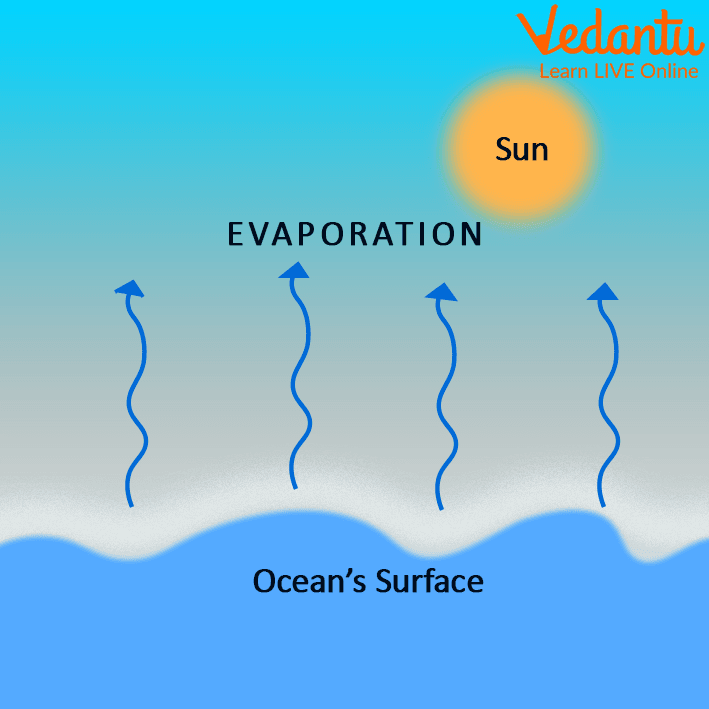




Why Does Evaporation Matter? Uses in Daily Life Explained
What is Evaporation in Science? Evaporation is a process in which water (liquid) turns into vapour. We can say that in evaporation a substance can be changed from liquid to vapour or gaseous state without boiling. In evaporation, a liquid turns into a gas. For example, when water is heated, the water molecules vibrate so fast that they are released into the atmosphere as water vapour.
Evaporation is a natural phenomenon that uses up the heat from the surrounding liquids. Although this happens mostly with hot liquids, it can also happen when the liquids are cold or at room temperature.
Evaporation is a superficial phenomenon because it mainly occurs at the surface of the liquid. For example, in a glass of water placed in the sun, water begins to evaporate from the surface, causing the water level to gradually decrease, indicating that evaporation is a surface phenomenon.

Drying Clothes is an Example of Evaporation
How Does Evaporation Happen?
We know that particles of matter are always in motion and collide with each other. This speed is less in the solid state but more in the liquid state because in the solid state, the force of attraction between the particles is greater than in the liquid state.
That is why when the liquid is left open in the air, it also collides with the air particles. In such a state, the particles on the surface of the liquid acquire more energy. Their energy increases so much that the attraction between them ends, due to which these particles leave the surface of the water and get converted into vapour and go into the air. This is how the process of evaporation takes place.

Evaporation Process
Factors Affecting the Rate of Evaporation
Following are the factors affecting evaporation.
The rate of evaporation increases with an increase in temperature and decreases with a decrease in temperature.
Humidity - The rate of evaporation decreases with an increase in humidity and increases with a decrease in humidity.
Surface Area - The rate of evaporation increases as the surface area increases.
Wind Speed - The rate of evaporation increases as the wind speed increases.
Solved Questions
What are the causes of evaporation?
Ans: When a liquid becomes a gas, vaporisation occurs. It evaporates when water is heated. Its molecules move and vibrate so fast that they are dispersed into the atmosphere in the form of water vapour molecules.
How does evaporative condensation form?
Ans: At the higher layers of the atmosphere, the water molecules move up by evaporation and finally reach the cooler air. The water vapour in the moist air condenses, forming large water droplets that gradually appear as clouds
Learning By Doing
Multiple Choice Questions (MCQs):
Which of the following is the most important component of the atmosphere for humans?
(a) Water vapour
(b) Dust particles
(c) Nitrogen
(d) Oxygen
Which of the following is the process by which water changes from liquid to gas?
(a) Condensation
(b) Evaporation
(c) Tanspiration
(d) Precipitation
Summary
Evaporation is the process in which the liquid changes from the surface of the liquid to vapour at each temperature is called evaporation. The rate of evaporation increases inversely proportional to the humidity of the atmosphere, proportional to the temperature of the atmosphere, and directly proportional to the surface area of the liquid.
FAQs on Evaporation for Kids: Definition, Process & Everyday Examples
1. What would happen if there was no evaporation on Earth?
If there is no evaporation, the existence of the earth will end. Without evaporation, there would be no rain which means there would be dry lifeless deserts almost everywhere on the continents. There will be no lakes or rivers.
The oceans will be less salty because as water from rain flows into the rivers and falls into the ocean, it carries with it some amount of salt or salts that maintain the salt-water balance in the ocean.
2. What is an example of evaporation?
An example of evaporation is the melting of ice and the evaporation of acetone which is used to remove nail polish.
3. At what temperature does evaporation take place?
It can happen even at normal temperatures.





















